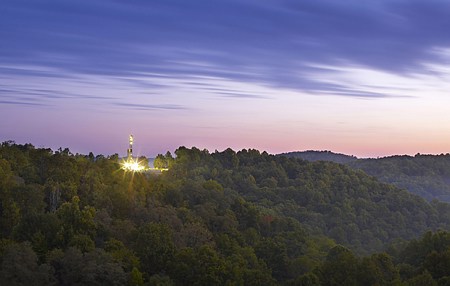Statoil was celebrating 10 years as a stocklisted company this week and promising more growth, but not everyone was keen to congratulate Norway’s biggest company. Instead, angry residents in the eastern United States believe Statoil’s much-touted shale gas extraction is contaminating their drinking water, leaving Statoil with another environmental problem.

Statoil already has been under harsh criticism over its involvement in oil sands projects in Alberta, Canada. Environmental organizations and even a group of grandparents in Norway are among those urging Statoil to pull out of the oil sands. Now a group of mothers representing worried residents of Pennsylvania are campaigning against another major energy project in which Statoil has invested billions: Shale gas extraction.
Statoil’s chief executive, Helge Lund, and a large contingent of top managment were in New York on Monday for a Capital Markets Day at the New York Stock Exchange and to mark the company’s 10th anniversary on the NYSE. Lund seized the opportunity to meet investors and analysts and announce that Statoil intended to boost its oil and gas production dramatically, from 1.9 million to 2.5 million barrels a day of oil and gas or their equivalents.
That includes shale gas extraction not least in the US, where Statoil is heavily involved in shale gas (called skifergass in Norwegian) operations in the northeastern US’ so-called Marcellus Formation running under the Appalachians in West Virginia, Pennsylvania, parts of Ohio and New York. Around 800 wells have been drilled in the Marcellus region since 2005 after geologists estimated the area can hold huge gas reserves that can be used as a needed source of energy.

Statoil is involved in the shale gas operations through a partnership with US firm Chesapeake Energy, which lately has been accused of serious pollution caused by leaks tied to its drilling. Statoil barely mentioned environmental issues in its announcement of ambitious growth plans on Monday, with Lund instead referring to shale gas as “highly reliable” and “clean,” and telling investors and analysts that Statoil planned to “step up our shale gas and liquids production” because of “significant resource potential.”
That’s not welcome news for people like Tanyette Colon and her neighbours who live in the Marcellus region. She represents a group called Mothers United for Sustainable Technologies, and they’re upset over Statoil’s and Chesapeake’s operations in the area.
Colon calls the shale gas extraction through hydraulic fracturing a “toxic process.” At stake, she claims, is the drinking water supply for up to 15 million people. Colon was in Norway this week and made an appeal on national radio Tuesday morning, hoping that “the Norwegian people” will “see the harm this toxic process is causing to families who live near the activity.”
Private property rendered worthless
Among them are Mike Phillips and his family in Bradford County, Pennsylvania, who told newspaper Aftenposten over the weekend that they can no longer drink water from their own well and that their house has suddenly become worthless. The contamination occurred after drilling by gas companies around his home, and he and his two other neighbors are suing Chesapeake Energy as operator of the project.
Truman Burnett, meanwhile, could show Aftenposten how the vacation property he’d planned to use as a retirement home has been polluted by gas leaks that have killed off the fish in his now-stinky pond, poisoned trees in the surrounding forest and ruined his drinking water. In his case, he told Aftenposten, Chesapeake has already acknowledged responsibility and paid a fine. Now he’s seeking compensation.
Some residents had leased out their land to the gas companies for drilling, and now seem to be paying the price for that. Burnett wasn’t among them, but his property was affected nonetheless. Most claim they are met with arrogance when they complain to the gas companies.
Companies won’t take all the blame
Chesapeake officials claim they are taking the all of the concerns seriously but many of the gas companies involved contend there already was methane gas in the ground and that it was a problem for the local residents long before drilling took off. Chesapeake told Aftenposten that it can’t be blamed for contaminated drinking water in all cases. It conceded that one of its subcontractors had a leak that contaminated Burnett’s property and that steps were being taken to repair the damage.
Statoil, meanwhile, admits that shale gas is controversial in parts of the US (New York has halted drilling over fears for the water supply) but that Statoil is confident problems can be solved. Spokesman Ola Morten Aanestad, noting that shale gas extraction is a new industry, told Aftenposten that Chesapeake has improved its drilling technology to prevent further leaks or contamination problems.
Statoil officials, however, seem to be letting Chesapeake take responsibility for the shale gas problems and opposition, since Statoil is not the operator in Marcellus. It will be, however, in another project in Texas. Norwegian environmental organization Framtiden i våre hender (The future in our hands) wants Statoil to drop the whole business.
“There’s enormous amounts of shale gas in the world, and can’t pump up the more conventional sources without destroying the climate,” Arild Hermstad, leader of the organization, told NRK. “In addition, the groundwater problems tied to extraction of shale gas are very serious.”
Views and News from Norway/Nina Berglund
Join our Readers’ Forum or comment below.
To support our news service, please click the “Donate” button now.

